|
|
|
Sort Order |
|
|
|
Items / Page
|
|
|
|
|
|
|
| Srl | Item |
| 1 |
ID:
166562
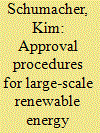

|
|
|
|
|
| Summary/Abstract |
This paper analyses the commonalities and variances of environmental approval procedures in four OECD territories, Japan, New Zealand (NZ), the European Union (EU), and the United States (US). In order to streamline regulatory approval frameworks for large-scale renewable energy (LS-RE) installations, outlining the strengths, as well as the weaknesses of the current systems in place, is crucial in determining what components to alter in line with national and regional particularities. The jurisdictional juxtaposition facilitates the identification of administrative burdens, which could increase environmental review-related costs for developers and prolong the entire approval process. Environmental impact assessment (EIA) frameworks, a major component of the LS-RE approval process, suffer from administrative fracturing between the local, regional, and national levels as well as between various government agencies. In combination with strong reservations from local civil society stakeholders, the results revealed some of the flaws of the current LS-RE project approval systems in place. The EIA frameworks and reform efforts in all four jurisdictions illustrate the importance of consolidated and comprehensive frameworks to reduce the amount of planning uncertainties for developers. Utilising regulatory tools such as mandatory timeframes, scoping, clear screening thresholds and priority assessment categories for LS-RE projects, could result in robust EIA processes based on unified regulatory procedures for climate change mitigating energy projects, inside as well as outside of OECD jurisdictions.
|
|
|
|
|
|
|
|
|
|
|
|
|
|
|
|
| 2 |
ID:
188558
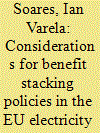

|
|
|
|
|
| Summary/Abstract |
Electricity Storage is a key activity in the European Union’s (EU) decarbonisation strategy. Indeed, storage facilitates the penetration of electricity from renewable sources into the grid by reducing the variability of renewable generation. Despite its importance, electricity storage is still perceived as a risky activity. The risk derives from the widespread need to secure multiple revenue streams in order to ensure profitability. This article investigates the risks influencing the development of electricity storage in the EU regulatory framework, focusing on benefit stacking. Benefit stacking refers to the diversification of services a storage asset can provide. This article evaluates some of the main regulatory barriers to benefit stacking in the EU electricity market and provides policy strategies to derisk this activity. The study is carried out using a multilevel analysis: the obstacles to stacking electricity storage services are investigated in EU law as well as in national law. After analysing the obstacles, policy recommendations are proposed to foster benefit stacking at both levels.
|
|
|
|
|
|
|
|
|
|
|
|
|
|
|
|
| 3 |
ID:
192773


|
|
|
|
|
| Summary/Abstract |
The transport sector accounts for about 20% of EU's GHG-emissions. Progress in emission reductions has been slow and primarily driven by biofuels promoted through national blending mandates. The mandates differ in whether they are measured in volume, energy, or emission reduction and in how gasoline and diesel are targeted. Due to this, national mandates and their effects have not previously been quantitatively compared on an EU level. In this article we convert the mandates for all EU member states between 2009 and 2020 to a common unit and study their impact on biofuel consumption, production, emission reductions and fuel prices. We find that mandates are driving biofuel consumption in the EU and correlates with emission reductions. Increased mandates have however often been fulfilled by blending biofuels eligible for double counting. We also find that reduction mandates have been effective in encouraging high-performance biofuels. For historical fuel prices, we do not see a clear correlation between countries' shares of biofuel and consumer fuel prices while the global oil price has a considerable impact. For biofuel production, increased demand drive investments in the EU, but when it comes to localisation of new plants factors such as local infrastructure are more important than national mandates.
|
|
|
|
|
|
|
|
|
|
|
|
|
|
|
|
| 4 |
ID:
166565
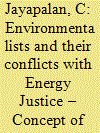

|
|
|
|
|
| Summary/Abstract |
This paper describes how a green energy surplus region changed over the years to a thermal energy-mix, driven by environmentalist forces’ strong opposition to Hydro-Electric Power Projects (HEPPs) in Kerala, India. The specific instance of the proposed Athirappilly HEPP is discussed against the background of the opposition of environmentalists and other sympathetic associations. The strong opposition to HEPPs in specific local contexts has led to increased emissions in other places. The tenets of Energy Justice – distributional, procedural, recognition and cosmopolitan – have been challenged by the environmentalists’ movement against the Athirappilly HEPP. The inherent conflicts between Environment Law and Climate Law on the one hand and the principles of Energy Justice and Law on the other are pointed out. The concept of “Power-Environ” is introduced and characterized, and its relation to Energy Justice and Law is explored in the policy context. The concept proposed here serves as a foundation for realizing parsimonious and effective representation of the opposition to HEPPs, and ushering Energy Justice and Law. The use of this concept, as an integrated whole founded on the principles of Energy Justice and Law, should facilitate balanced policy-making in the Energy sector, especially in India and hopefully across the world too.
|
|
|
|
|
|
|
|
|
|
|
|
|
|
|
|
| 5 |
ID:
168336
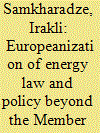

|
|
|
|
|
| Summary/Abstract |
The external dimension of EU energy law is gaining momentum in legal scholarship. The European Union has reached a certain degree of influence in exporting its internal energy rules and values beyond the Member States. Nevertheless, the theory of legal harmonisation between the EU and ‘third countries’ remains underdeveloped. This paper aims to address this deficit by analysing the effects of legal harmonisation in energy outside the current domain of the EU. The paper draws on the example of Georgia, as a Contracting Party to the Energy Community Treaty, and assesses the potential impact of EU energy legislation on Georgia's municipal law triggered by the Community membership. It further uncovers a number of uncertainties that are likely to arise before Georgia in the course of implementing the energy acquis and advocates for the process to be guided through a set of common energy law principles. These aspects are discussed to explain the nature of expanding EU energy law and policy in ‘third countries’ and to contribute to the ongoing debate about energy law, as an emerging academic discipline.
|
|
|
|
|
|
|
|
|
|
|
|
|
|
|
|
| 6 |
ID:
166570


|
|
|
|
|
| Summary/Abstract |
Modern electricity markets are characterized by an increasing share of renewable electricity generation. This growth in the share of renewables yields a highly intermittent generation structure. To efficiently integrate renewable electricity generation into our energy system, flexibility options ranging from storage facilities to demand-side management will play a major role in the low-carbon energy transformation. Keeping up with the growing demand for flexibility, energy law must reduce current investment obstacles for flexibility options and establish a climate for future investments with sufficient incentives for private investors. By taking up perspectives from different disciplines, this paper summarizes current investment barriers, presents an overview of the existing legal energy investment framework of the EU and Germany, and elaborates on challenges of the presented legislation. As we argue, a well-designed energy market legislation will be one of the keys to a successful energy transition. However, policy makers will have to (i) lower investment uncertainty for private investors, (ii) avoid a distortion of energy investment law towards specific flexibility options and technologies, and (iii) reduce the complexity of the current legislation.
|
|
|
|
|
|
|
|
|
|
|
|
|
|
|
|
| 7 |
ID:
166438
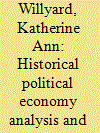

|
|
|
|
|
| Summary/Abstract |
Flaring (i.e., burning natural gas extracted at an oil or gas well) is an economically wasteful and environmental harmful industrial practice. Although initially banned in Texas, Texas Statewide Rule 32 currently allows oil wells to obtain a permit to legally flare gas. Through a thick description based on archival research, this paper explains: (1) how Texas flaring regulations emerged and weakened over time, (2) why Texas flaring regulations weakened, and (3) the implications of formal policy changes. This paper argues historical political-legal developments created new opportunities for companies to legitimately flare extracted natural gas. As new shale oil and gas development occurs in previously unreachable areas, incentives for immediate profits often outweigh the benefits of investing in the infrastructure and technology necessary to use extracted natural gas for productive purposes.
|
|
|
|
|
|
|
|
|
|
|
|
|
|
|
|
| 8 |
ID:
190609


|
|
|
|
|
| Summary/Abstract |
Microgrids are decentralised electricity systems that can operate independently of the main electricity network, and which have the potential to contribute to the energy transition towards a more sustainable energy mix. However, the integration of the system in the EU electricity market is not regulated and the resulting uncertainty discourages the system's development. This article provides the first step towards increased legal certainty for microgrid users and initiators by developing a regulatory approach based on three different microgrid ownership and operation models. If the existing rules in EU energy law allow for some flexibility to include electricity household consumers under the provisions of Closed Distribution Systems and allow for Citizens Energy Communities to manage part of the distribution system, the legal framework does offer possibilities to regulate microgrids. Nevertheless, many legal questions remain, in particular regarding responsibilities of active customers, consumption management, and regulation of flexibility services. In addition, the regulatory approach towards microgrids depends on EU Member States granting energy communities the right to manage part of the distribution network, which now depends on the discretion of the Member States. This discretionary nature should be reconsidered given the significant potential for local initiatives to contribute to the energy transition.
|
|
|
|
|
|
|
|
|
|
|
|
|
|
|
|
| 9 |
ID:
166440


|
|
|
|
|
| Summary/Abstract |
Depending on Iraqi constitution the Kurdistan Regional Government (KRG) has signed more than sixty oil and gas contracts with international oil companies (IOCs). These contracts have ignited significant disputes between the KRG and the federal government. The Iraqi government claims that KRG's contracts are illegal and the KRG has misused Iraqi natural resources. On the contrary, the KRG argues that Iraqi constitution has granted the KRG the right to manage its natural resources. The purpose of this paper is to examine the extent to which the Iraqi constitution grants KRG the power to sign oil contracts with IOCs. To investigate this issue, KRG's oil contracts are mainly analyzed under the light of (1) Iraqi constitution, (2) draft of oil and gas law in Iraq and (3) Kurdistan's oil and gas law. Further, primary data are collected by interviewing thirty Parliamentary members in Iraq. The paper found that the Iraqi constitution has granted the KRG's enactment of oil and gas law and the power to sign oil contracts with IOCs. However, the KRG has exceeded its power in its law and contracts by waiving of sovereign immunity for IOCs. Thus, major amendments of KRG's oil and gas law are recommended to be in line with Iraqi constitution. Transparency and decentralization of the KRG's petroleum policy are also recommended.
|
|
|
|
|
|
|
|
|
|
|
|
|
|
|
|
| 10 |
ID:
166551


|
|
|
|
|
| Summary/Abstract |
This paper investigates the legal barriers to apply project finance for building nuclear power plants. Countries such as the UK, Turkey and emerging economies (i.e. Malaysia and Indonesia) are increasingly seeking to attract private investors for nuclear projects using project finance. This is an innovative approach, and until now the only cases registered are Hinckley Point C in the UK and Akkuyu in Turkey. This paper scrutinises the mismatches between the requirements of project finance and nuclear law. Nuclear law introduces specific requirements affecting the security interest of private lenders, hindering the bankability of nuclear projects on a non-recourse basis. The paper emphasises that the performance-based regulatory approach is more compatible with project finance compared to the prescriptive based one. Furthermore, the paper examines the gaps between nuclear and holistic energy law, looking at the financing of energy infrastructures. Improving nuclear law enables to apply project finance to nuclear power plants, facilitating their deployment. Consequently, nuclear law plays a central role in promoting sustainable energy mixes characterised by reduced carbon emissions.
|
|
|
|
|
|
|
|
|
|
|
|
|
|
|
|
|
|
|
|
|